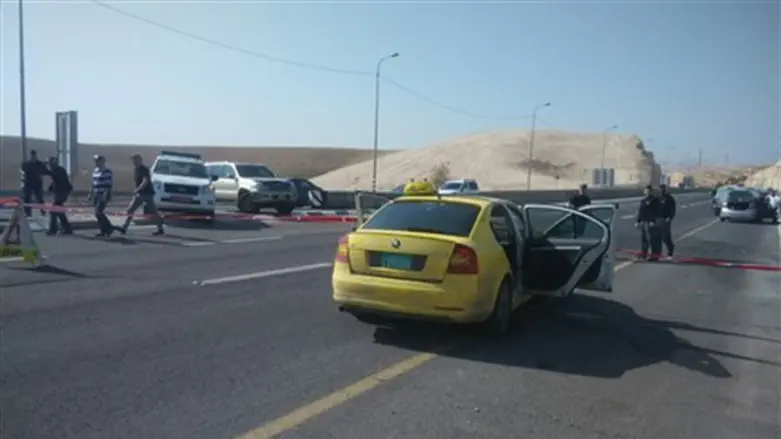
An Arab terrorist who attempted to murder soldiers in a ramming attack did so because of debts he had accumulated, in the knowledge that the Palestinian Authority would support his family if he were jailed or killed after the attack.
In February 2014, Palestinian Authority resident Khaled Rajoub attempted to ram his car into a group of IDF soldiers near the town of Beit Hagai in the Hevron district. Fortunately, Rajoub failed to hit any of the soldiers and was taken into custody.
Rajoub’s failed terror attack more than three years ago entered the spot light again this month, following a hearing in the US Senate regarding the “Taylor Force Law”; a bill which if passed would bar US funding of the Palestinian Authority so long as the PA pays out stipends to terrorists and their families.
Following the recent Senate hearing, the Palestinian Media Watch organization has released the transcript of Rajoub’s interrogation, which took place shortly after his failed attack.
In it, Rajoub admits to Israeli security agents that it was the Palestinian Authority’s policy of supporting the families of jailed terrorists or terrorists killed in terror attacks that motivated him to attempt to kill Israeli soldiers.
“I want to tell you honestly, and from the end,” Rajoub told investigators. “I am a man with a family of seven, including myself and my wife. I don’t work, and I’ve accumulated large debts, and am unable to pay them off. I reached a point where, if my son wants a shekel, I have nothing to give him.”
“Therefore I decided to die – it didn’t matter how - by hanging - any way, [just] to die. I thought about it and said to myself that if I die by hanging, or any other way, I won’t get anything out of it, so I decided to do something serious, such as committing murder, something in which I will both kill and get killed, and then my family will get money and will live comfortably. In other words, something will come out of my death. In the end I decided to kill Israeli soldiers.”
Rajoub then described the attack itself.
“I got in a car and drove to Al-Fawwar, to the junction, because there’s always a military post there, and I said [to myself] that I’ll run them [the soldiers] over in my car and murder as many as I can, and they’ll shoot me and kill me.
“However, I didn’t find a military post in Al-Fawwar. I continued to drive to a second point, to the gate of Hagai because I know there are always soldiers standing there, and I said to myself that I’ll run them over and kill as many as possible, and they’ll kill me. However, I did not find [any soldiers] there either. I had no other hope or way, so I broke through the gate of the settlement. I said [to myself] I can kill the guard, and then they’ll shoot me. I broke in with my car and broke it [the gate] and rammed into the second gate.
“But I couldn’t break it and the guards were behind the second gate. I tried to break it in order to bring it down on them, but it didn’t come down, and they didn’t shoot me, but caught me instead. I was injured during the incident and they took me to a hospital for four hours. They returned me to [Beit] Hagai, and from [Beit] Hagai to Etzion, and that’s what happened…”
When asked by investigators why he targeted soldiers and not civilians, Rajoub said he hoped he would killed on the spot.
“The best is to kill soldiers. That way they have guns and they’ll shoot me and kill me. But if I’m not able to kill soldiers, I’ll try settlers, guards - in other words any Israeli target – the important thing is that I will die and they will kill me, so that my children will receive an allowance and live happily.”
Even after his failed attempt, Rajoub told investigators he was “determined” to die while harming Israelis, and would make another attempt to do so if freed.
“I’m telling you – if they set me free, I’ll do it again as soon as possible. I’ll bring another car, and I’ll run over [the soldiers] at the first military post I see. I’ll kill as many as possible, and they’ll shoot me, and I’ll die. There is no other solution.”
